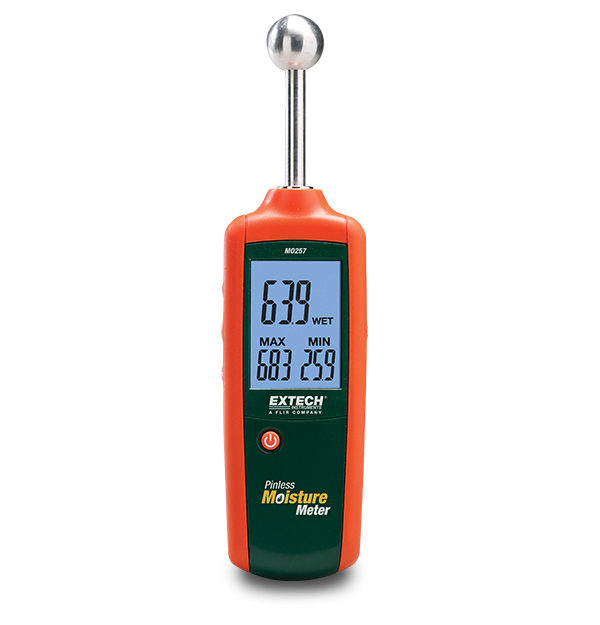The Ultimate Guide to Moisture Meters: A Comprehensive Review and Just How They Can Save You Money
In the world of structure maintenance, building and construction, and various markets, the significance of accurately determining moisture degrees can not be overstated. Dampness meters work as essential devices in detecting and monitoring moisture material in products, assisting in protecting against expensive problems and guaranteeing the top quality of items. Recognizing the subtleties of different kinds of dampness meters, their applications, and the possible cost-saving benefits they offer can be a game-changer for professionals and companies alike. Finding just how these gadgets can not only enhance procedures but likewise add to economic cost savings is a journey worth starting.
Sorts Of Dampness Meters
Different kinds of dampness meters are readily available for various applications in various markets. One usual kind is the pin-type wetness meter, which determines the electrical resistance in between two pins inserted right into a material. This kind appropriates for timber, drywall, and various other building products. Pinless dampness meters, on the other hand, use electro-magnetic sensing unit plates to scan a bigger area without creating damage to the product's surface area. Moisture Meter. These meters are perfect for quickly analyzing wetness degrees in large locations such as walls and floorings.

Infrared moisture meters measure the thermal properties of a product to identify its dampness web content non-invasively, making them valuable for applications where pin or pinless meters may not be appropriate. Understanding the different types of moisture meters offered can aid sectors select the most proper device for their certain dampness measurement demands.

Benefits of Using Moisture Meters
Dampness meters provide invaluable advantages in accurately checking and examining wetness degrees in diverse materials and atmospheres. One of the main benefits of making use of moisture meters is the avoidance of possible damage triggered by excess wetness.
Furthermore, utilizing moisture meters can cause boosted power efficiency. By determining locations with high moisture degrees, such as leaks or poor insulation, adjustments can be made to boost energy preservation and decrease utility prices. In farming settings, dampness meters play an essential function in maximizing plant yields by making it possible for farmers to check soil moisture degrees and make informed watering choices. Overall, the advantages of using dampness meters span across various markets, supplying cost-efficient options and advertising much better quality control methods.
How to Select the Right Moisture Meter
When selecting a wetness meter, it's vital to guarantee that the meter is suitable for the specific product you will certainly be testing. Various materials have differing electric buildings that can influence wetness readings, so picking a meter developed for your material is crucial for accurate results. By meticulously reviewing these aspects, you can pick a moisture meter that satisfies your needs and offers accurate dampness measurements for your projects.
Appropriate Methods for Dampness Meter Use

Price Cost Savings Via Moisture Meter Applications
Just how can the critical use of moisture meters lead to significant cost savings across numerous markets? Wetness meters play a critical duty in cost savings by stopping prospective damages and making certain quality assurance in different markets. In the farming market, wetness meters aid in determining the ideal time for gathering crops, protecting against excess or over-drying moisture that can influence the last item's high quality. This precise tracking assists farmers stay clear of unneeded losses and maximize their return.
Likewise, in building, wetness meters aid stop pricey problems by finding dampness degrees in structure materials, such as wood or concrete, which can bring about structural problems otherwise addressed immediately. By identifying issue locations at an early stage, contractors can take rehabilitative procedures to stay clear of extensive fixings or substitutes, inevitably conserving time and money.
Moreover, in the food processing sector, wetness meters are crucial for monitoring product top quality and making sure compliance with security regulations. By properly measuring moisture content in food, producers can prevent perishing, keep quality, and reduce waste, resulting in substantial price savings. On the whole, the strategic application of wetness meters is a beneficial financial investment that can bring about substantial price reductions and improved efficiency throughout numerous industries.
Final Thought
In verdict, moisture meters are important devices for determining and spotting wetness degrees in numerous products. By utilizing the appropriate dampness meter and following proper pop over here methods, users can effectively prevent costly damages triggered by excess dampness. Buying a quality dampness meter can bring about significant cost financial savings over time by recognizing potential issues early on and making it possible for timely remediation. Ultimately, dampness meters are essential tools for preserving the integrity and longevity of frameworks and products.
Wetness meters offer as essential devices in identifying and checking moisture material in products, aiding in protecting against costly problems and ensuring the high quality of products. Infrared moisture meters gauge the thermal residential properties of a product to identify its wetness material non-invasively, making them valuable for applications where pin or pinless meters might not be suitable.Moisture meters use vital benefits in properly analyzing and monitoring moisture levels in diverse materials and atmospheres. In farming setups, dampness meters play an essential function in optimizing crop returns by allowing farmers to keep an eye her response on soil wetness levels and make notified watering decisions.In verdict, dampness meters are useful devices for detecting and measuring wetness levels in numerous materials.